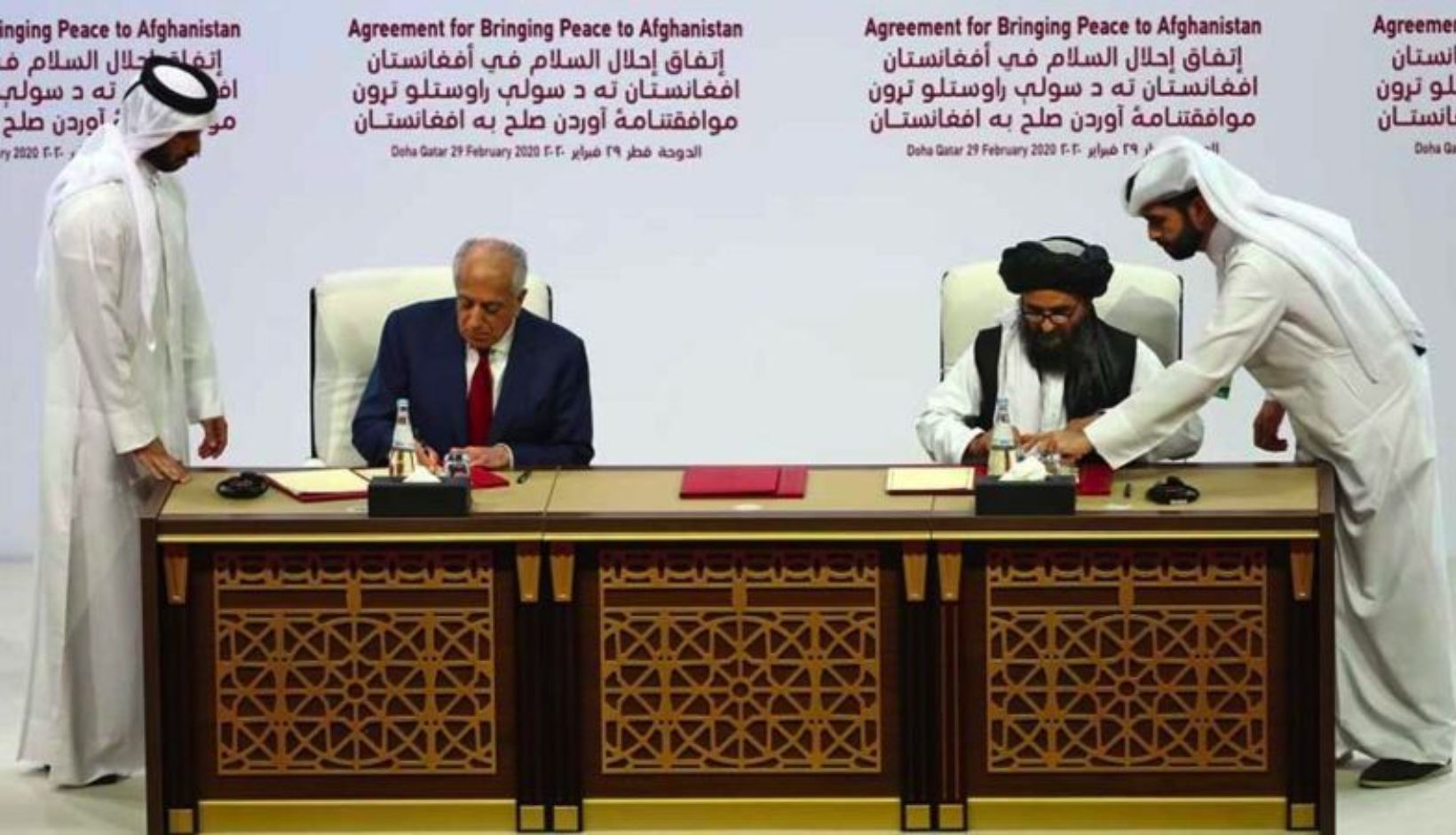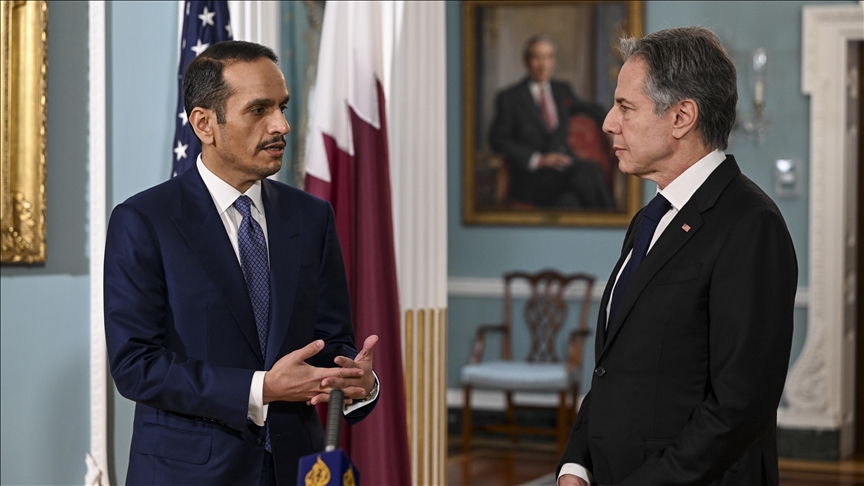Giving the example of successful diplomacy and effective mediation, the Qatari Foreign Ministry dealt with the crisis in Afghanistan bridging the gaps between the conflicting parties and finding solutions for challenges created by the sudden US pullout.
Qatar’s gradual approach
The Qatari approach towards Afghanistan progressed over careful diplomatic steps. Doha made great efforts with all parties, constantly seeking to reassure Washington and all regional and international parties. Here are examples of Qatari efforts before and during the Afghan refugee crisis following the US withdrawal from Afghanistan:
Qatari diplomacy: Long history of mediation in Afghanistan
Qatar’s status as a mediator with the Taliban has evolved over years, particularly since the opening of a political office for the Taliban in Doha according to an agreement with the US. The office was opened in 2013, after the failure of direct negotiations between the Taliban and representatives of Afghanistan and NATO. The failure highlighted the need for a clear channel of communication with the group.
Even when talks between the Taliban and the former Afghan government stalled in 2020, western governments and international organizations accepted Qatar as a point of contact with the group, and the foreign ministers of the UK, the Netherlands, Italy and the US hailed the Qatari role.
Despite attempts by other governments to assume a mediation role, Qatar has been the most persistent and successful in performing this task and has proven its effectiveness as a mediator acceptable to all parties.
Notable stations of mediation train
Mediation began in 2009 and its most significant stages included:
- March 2009: The first stage of the negotiation, which began when former US President Barack Obama indicated in an interview with the New York Times the possibility of a dialogue with the Taliban.
- November 2010: Qatar participated in the first negotiation meeting that brought together US officials and representatives of the Taliban in Munich, Germany.
- February 2011: Doha hosted the second meeting between the US officials and representatives of the Taliban.
- May 2011: Germany hosted the third meeting between the Taliban and Washington, and the two parties agreed to lay the foundations for a final solution to the conflict.
- January 2012: After extensive communications, a new round of negotiations was held in Doha between five Taliban officials and the US negotiators. Principles were agreed upon to build confidence between the two parties, including opening an office for the Taliban in Doha and exchanging prisoners.
- June 2013: The Taliban opened its office in Doha to facilitate peace negotiations.
- October 2018: This stage witnessed a new shift in the negotiations, as Zalmay Khalilzad was appointed as the US President’s special envoy to Afghanistan, and a new negotiation round was held with the Taliban in Doha. In parallel, Mullah Abdul Ghani Baradar was released from prison to lead the group’s office in Doha and represent it in negotiations.
- July 2019: Doha hosted an intra-Afghan dialogue under the auspices of Germany. About 60 Afghan figures from various backgrounds participated in the talks, along with 17 members of the Taliban, with the aim of achieving comprehensive national reconciliation. The dialogue went parallel to a new round of negotiations between the Taliban and the US.
- December 2019: Peace talks resumed in Doha months after negotiations were suspended by former US President Donald Trump, as the US attempted to reach practical solutions to end the war.
- February 2020: A peace agreement, described as historic, was signed in Doha by the Taliban and Washington. The deal sought to put an end to the war that lasted then for 19 years. It was an agreement that former President Trump described as “pivotal” and came after a “difficult journey for everyone” in Afghanistan.
- September 2020: Negotiations began again between the Taliban and Afghanistan in Qatar.
- August 10, 2021: The International Conference on Afghanistan was held in Doha with the aim of assessing the status of negotiations between the Afghan parties, exchanging views between the negotiators, and thinking about the contributions that the international community can make to the success of the peace process. The conference was attended by representatives of the US, the UK, Qatar, China, Uzbekistan, Pakistan, the UN, and the EU. Participants expressed support and gratitude for Qatar and its efforts to bring peace to Afghanistan.
- August 14, 2021: Qatar’s FM Sheikh Mohammed bin Abdulrahman Al Thani met with Mullah Abdul Ghani Baradar, head of the Taliban’s political office. At the meeting, Sheikh Mohammed urged the Taliban to de-escalate, thus contributing to accelerating efforts to reach a comprehensive political settlement that would ensure a prosperous future for the state and people of Afghanistan. The two parties met again on August 17 to complete the talks.
The subsequent stations underscored how Qatar was pivotal over years in delivering creative solutions for the conflicting parties on the way of promoting global peace and security, which is the priority of Qatar’s foreign policy that endeavors it through working on conflict resolution and international cooperation.
Bright milestones: Prisoner exchange deals
Qatari mediation between the US and the Taliban spanned several rounds ending up with the success of two prisoner exchange deals, the first in May 2014 and the second in September 2022.
May 2014: First prisoner exchange
At the end of May 2014, the Taliban handed over captured US Sergeant Bowe Bergdahl, 28, to the US mission in Afghanistan. In return, the US administration released five of the most high-profile Taliban leaders detained in Guantanamo.
Negotiations
Negotiations between the two parties began early in 2012, with the US negotiators meeting face-to-face with the Taliban leaders in Qatar. The talks achieved little if any progress at that time due to the US administration’s desire to push the process in the direction of broader peace, while the Taliban wanted to limit the talks to the prisoner exchange. The US, however, maintained the Qatari-brokered talks until the exchange took place in May 2014.
Bowe Bergdahl
Sergeant Bowe Bergdahl, from Haley, Idaho, served in an infantry division in Paktika, near the Afghan border with Pakistan. He went missing at the end of June 2009, months after joining US forces in Afghanistan.
Taliban leaders
The US released five Taliban leaders on condition that they do not leave Qatari territory for at least a full year. The leaders are:
- Muhammad Fazal: Deputy Minister of Defense in the Taliban government.
- Khairullah Khair Khawah: A high-ranking Taliban official who served as Minister of Interior and Governor of Herat, the third largest city in Afghanistan.
- Abdul Haq Watheq: Deputy Minister of Intelligence in the Taliban government.
- Nurullah Nouri: Governor and senior military commander in the Taliban.
- Muhammad Nabi Omari: Taliban security commander.
September 2022: Second prisoner exchange
The US president and Afghan officials announced that the Taliban had released Mark Frerichs, a former American soldier who was taken in 2020 in Afghanistan, in exchange for an important Taliban ally, Bashir Noorzai, who was incarcerated in US jail.
Negotiations
Qatari officials played a major role over months to draw up the deal after long negotiations. “This morning at 10 a.m. the American citizen was handed over to an American team at Kabul airport and Haji Bashir was handed over to the Islamic Emirate,,” Amir Khan Muttaki, the Afghan Foreign Minister, tild reporters in Kabul.
“Bringing the negotiations that led to Mark’s freedom to a successful resolution required difficult decisions, which I did not take lightly,” US President Joe Biden said. The US administration did not provide further details, however, diplomats told AFP that Qatar helped the US intensify its contacts with the Taliban in the months following the withdrawal of US forces from Afghanistan.
Mark Frerichs
Frerichs was a US Marine, who worked later as a civil engineer in construction projects in Afghanistan. He was detained for 31 months by the Taliban. After being handed over to the Americans, he headed to Doha.
Bashir Noorzai
According to Zabihullah Mujahid, the Taliban’s official spokesperson, Noorzai did not hold an official position within the organization, but he provided significant support to the Taliban in the 1990s. He was detained for 17 years before being released.
After Qatar’s successful role of mediating the crisis in Afghanistan over years, the Qatari efforts revealed the pioneership of Qatar in managing the crisis and affirming its commitment to global peace and security, using diplomacy as a key tool to reassure peace and stability.



